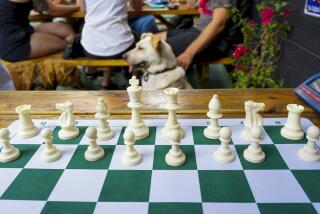Kasparov Retains Chess Title With Draw in Game 23
- Share via
MOSCOW — Ebullient Gary Kasparov retained his world chess title Monday when his challenger, Anatoly Karpov, offered a draw in the 23rd game, giving Kasparov the 12th point he needed to win the match.
The victory in Leningrad by Kasparov, 23, pointed toward a shake-up in the World Chess Federation and may help to popularize the game in the West.
“Of course, I am happy because I defended the title,” Kasparov said. “I was sure I would not lose this game. It was a very aggressive game.”
Karpov was the first to congratulate Kasparov, who had toppled Karpov last November after he had reigned for nearly a decade as world champion.
Monday’s draw, after 32 moves, ended one of the longest marathons in chess history. Over the last two years, in three title matches, Karpov and Kasparov have played a total of 95 games, with Kasparov holding a 13-12 edge in games won. They also have played 70 draws.
Grandmasters say that the two men rank far above today’s other top chess players in overall ability.
In the clutch, however, Karpov tended to tense up while his opponent seemed to thrive on tension.
The 24th game in the match will be played as scheduled Wednesday, but its result cannot disturb Kasparov’s victory. Under the rules, Kasparov, who now has 12 points to Karpov’s 11, retains the title in the event of a 12-12 tie.
A draw Wednesday would result in a final score of 12 1/2 to 11 1/2 for Kasparov. Each victory counts a point for the winner while a draw gives each player half a point.
Karpov, 35, now faces an additional hurdle if he wants to try to regain the title. He must face another young Soviet master, Andrei Sokolov, 23, who won a contenders’ tournament Sunday, for the right to challenge Kasparov next year.
As a chess player, Kasparov is something of a gambler, often sacrificing pawns to obtain a better attacking position. At times, chess experts say, he is somewhat reckless, and he lost three games in a row to Karpov after making questionable moves in this tournament.
Karpov is a cautious strategist who tends to wait for his opponents to make a mistake.
Regarded as politically reliable, Karpov has been the darling of the Soviet chess establishment. Kasparov, on the other hand, showed a rebellious streak, and his half-Jewish, half-Armenian origins were regarded as suspect.
Their first encounter, in 1984-85, began with a series of triumphs for Karpov, who led 5-0 at one point under former rules requiring six victories to take the match.
But Kasparov, wearing Karpov down in a long series of drawn games, later won three games, making the score 5-3. In a controversial move at that point, President Florencio Campomanes of the World Chess Federation canceled the match on grounds that both players were exhausted.
Both immediately protested, and Kasparov was bitter. He charged Campomanes with acting to rescue Karpov from defeat and demanded the official’s ouster from his post.
In a second title match played last fall, Kasparov won brilliantly in the final game to capture the match 13-11. The rematch, originally set to begin in February, was delayed until summer, with 12 games in London and the final 12 in Leningrad, Karpov’s hometown.
In the Soviet Union, where children start to learn to play chess before they start school, there are millions of players and avid fans. Except for the brief interval when American Bobby Fischer held the world championship in the early 1970s, Russian players have dominated the game in this century.
Thus, the Soviets have strong influence in the chess federation, and it appears they will use it in November to help oust Campomanes and elect Lincoln Lucena, a Brazilian, who is running for president of the world body.
Lucena wants to make the game more popular around the world by staging more tournaments and seeking commercial sponsorship, much like professional tennis.
Despite his reputation as a maverick, Kasparov joined the Communist Party at the age of 19 and is a member of the Central Committee of the Young Communist organization in his home republic, Azerbaijan.
He began playing chess as a child and won the status of grandmaster at 17. He was the youngest world chess champion in history when he first won the title at age 22.
Kasparov was born in Baku, the capital of Azerbaijan. His father was Jewish, and the family name was Weinshtein, but his mother, an Armenian whose maiden name was Kasparian, Russianized it to Kasparov with the idea that it might be helpful to her son’s career.
Here are the moves:
Karpov-Kasparov 23: 1 Nf3 Nf6 2 c4 b6 3 g3 c5 4 Bg2 Bb7 5 0-0 g6 6 d4 cxd4 7 Qxd4 Bg7 8 Nc3 d6 9 Rd1 N(b)d7 10 b3 Rc8 11 Bb2 0-0 12 Qe3 Re8 13 R(a)c1 a6 14 Ba1 Rc5 15 a4 Qa8 16 Ne1 Rf5 17 Bxb7 Qxb7 18 f3 h5 19 Ng2 Rc5 20 Bb2 R(c)c8 21 Ba3 Nc5 22 Rb1 Ne6 23 Qd3 Nc7 24 Nf4 b5 25 Cxb5 Axb5 26 Nxb5 Nxb5 27 Qxb5 Qxb5 28 Axb5 Rb8 29 Bb2 Rb7 30 b6 R(e)b8 31 b4 Nd7 32 Bxg7 Draw agreed.
